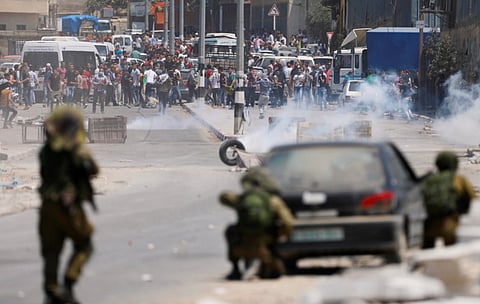Let Arab media be more vocal on Palestinian plight
There is an urgent need to highlight the plight of Palestinian prisoners on hunger strike in Israeli prisons

The Arab media has long been criticised by the people for being lousy. And to a great extent such allegations carry merit. The media often trumpets what the public is required to know. It is only in recent times that, faced with increased competition from regional and global news services, Arab media has been compelled to show interest in more crucial issues.
The change hasn’t been dramatic though. Issues of global interest have been strangely ignored as is the case with the hunger strike that Palestinian prisoners in Israeli jails began last month and is approaching 20 days now. More than 1,800 Palestinian political prisoners are on hunger strike. Salt and water are all they will take until their just and rightful demands are met. What are they asking for? Basic decent treatment in prison based on international law. It sounds simple, but this is a weighty request even in Palestinian and human history. The price one pays for resistance to Israeli occupation and oppression is injury, imprisonment or death. It is the antithesis of selfishness and greed.
The Israelis had imprisoned more than 800,000 Palestinians in Israeli jails over the years, for crimes as simple as being non-Jewish. Today, almost 7,000 are there, locked up in the colonial apartheid Israeli prisons and denied all legal counsel. While such Israeli atrocities are part of universal knowledge, the hunger strike brought the prisoners’ message home to all — the rich and poor, the greedy and self-sacrificing, the honest and the liar. The message intended by the hunger strike is nothing short of that “we humans must reconnect to our humanity and that caring for others is the way to save humanity. In this 21st century, with weapons of mass destruction and climate change, we cannot afford as a species to do otherwise”.
Professor Mazin Qumsiyeh, at Bethlehem University, and director of the Palestine Museum of Natural History in Bethlehem, says: “Prisoners show us the way like many decent human beings showed us the way before (think of Jesus and prophets and revolutionaries like Che Guevara). But the alarm bells for us are now alarm bells for a dying species unless we act. It is more urgent than ever in our short history on earth. We really have a choice to make and it is both an individual and a collective choice. That choice is to either accept war and greed as ‘natural’ and follow the other human lemmings over the cliff or resist and give of ourselves as a way to save humanity.”
The professor adds: “Hunger is painful and people will die sooner or later unless we all act. What is at stake is very high: Our own self-respect (dignity) as human beings. But as the world changed, the danger is that we can also go extinct as a species unless we manage to collectively transcend a huge baggage of greed, colonialism and capitalism that cannot be sustained in the 21st century. Palestinian prisoners by their silent deeds of self-sacrifice have shown us the way. As did martyrs like Basil Al Araj, who simply noted in his extremely short last words on paper: ‘There is no more eloquent speech than the deed of the Martyr’.”
While the hunger strike will have to prove its sustainability in the face of Israeli intransigence in the coming weeks, there are enough indications to believe that something different is beginning to stir.
In recent years, the prisoner issue had slipped from the Palestinian public’s priorities as they confronted worsening threats like home invasions, cold-blooded killings by illegal Israeli colonists, home demolition and forced displacement in the West Bank and military offensives in Gaza. Inside the prisons, Israel’s repressive tactics, factional divisions and general fatigue have also tended to dissolve hunger strikes from collective actions into individual protests.
However, the resilience and defiance of the Palestinian people for their rights live on. The new strike is therefore as much about restoring a sense of political direction as it is about demanding prisoners’ rights.
Amjad Iraqi, a Palestinian Israeli says: “If the strike is able to sustain itself and energise the Palestinian public, the prisoners could reclaim the people’s faith in their political leadership — something that neither the PNA [Palestinian National Authority] nor Hamas governments have been able to retain. In Barghouti’s words, the strikers hope that their latest action, under the slogan of ‘Freedom and Dignity’, will demonstrate once more that the prisoners’ movement is the compass that guides our struggle.”
While these struggles are going on daily with tragic consequences, as some prisoners succumb to their fasts, the Israelis have not relented and allowed them access to due process of law.
It is unfortunate that Arab media has by and large failed to come on board to highlight this latest of struggles by an oppressed people.
Tariq A. Al Maeena is a Saudi socio-political commentator. He lives in Jeddah. You can follow him on Twitter at twitter.com/@talmaeena.


